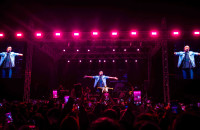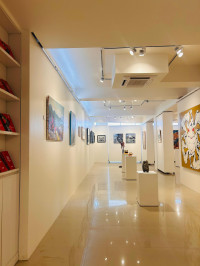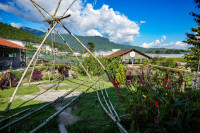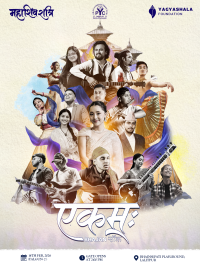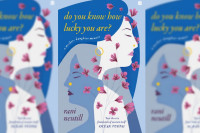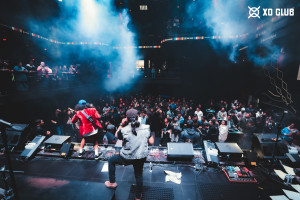Culture & Lifestyle
A celebration of global Jazz harmony
Jazzmandu founders, Chhedup Bomzan and Navin Chettri, reflect on its origins, recalling their early days ‘scheming’ to bring jazz to Nepal.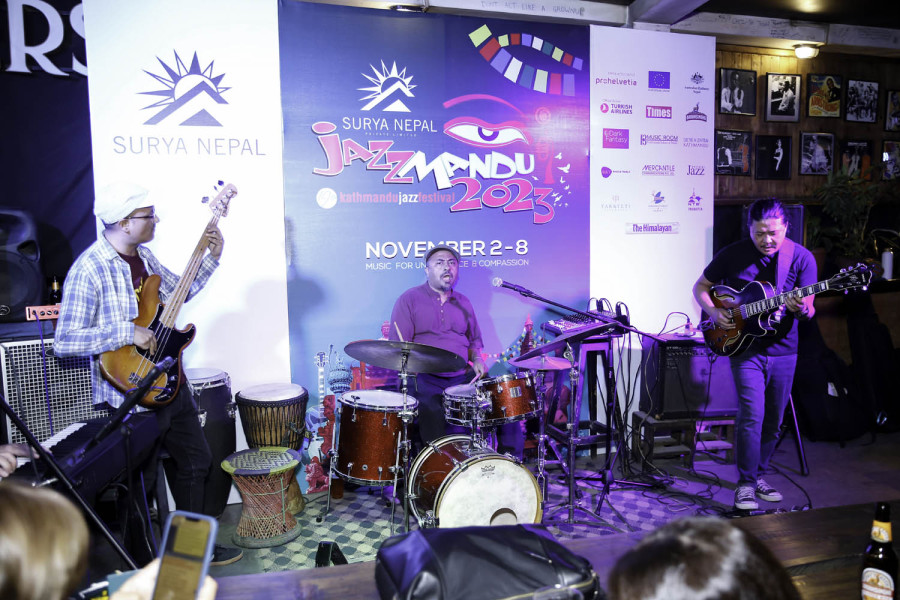
Ayse Turcan
Just five minutes into the jam session, Jazz Upstairs is already in full swing. Every corner of Kathmandu’s beloved jazz venue is occupied; people are seated on chairs, on the floor, and standing in the hallway, all trying to catch a glimpse of the artists. The bass, guitar, saxophone, and drums create a lively atmosphere. Navin Chettri, one of the festival’s co-founders, sits behind the drum kit, nodding to the beat of the music.
‘Grooving at Upstairs’ not only sets the tone but is also the name of the opening event for Jazzmandu, a week-long festival traditionally held at Upstairs. This continues in the 19th edition of Nepal’s largest jazz festival. The festival’s roots trace back to Chhedup Bomzan, the owner of Jazz Upstairs, and Chettri, drummer and vocalist of one of Nepal’s first jazz bands, Cadenza Collective, who used to play at Upstairs regularly. The band played all different kinds of music before becoming “infected with the jazz bug,” says Chettri. The bug stuck.
The day before the festival kicks off, Chettri sits in his office in a quiet alley near the city centre. Through the window, one can hear the birds and, from downstairs, the twisting melody of a trumpet, soon joined by a whole band. Chettri reminisces about the early days when jazz was scarce in Nepal. “We started scheming to build a jazz scene here,” he chuckles. In 2002, Chettri and Bomzan collaborated to organise Nepal’s inaugural international jazz festival, featuring bands from the UK and Australia alongside local musicians.
The festival has been an annual event since its inception. Certain sessions, such as ‘Jazz at Patan’ and ‘Grooving at Upstairs’, have remained constant, but other aspects have changed over time. They also tried out many things to see what would work. One year, the festival was a 14-day event instead of the regular seven. “We even held events in Pokhara,” says Chettri.
Over the past two decades, the popularity of jazz has grown significantly. By bringing international artists to Nepal and offering educational programmes for jazz students, the festival has not only advanced jazz in the country but also put Nepali jazz on the global map. “No one asks me what jazz is anymore,” Chettri remarks.
Regarding this year’s edition, Chettri compares the excitement to the anticipation of the World Cup, albeit on a much smaller scale. “People know the format, but who the players are and where they’re from—that’s what makes it special.” As the artistic director, Chettri ensures each year’s programme is unique. The lineup includes familiar faces like saxophonist Nick Aggs and new guest musicians visiting Nepal for the first time.
As a musician, Chettri is keenly interested in the artists he invites to Kathmandu. “I’m really looking forward to performing with some of these musicians,” he says with a smile. Gesturing towards the source of the music, he adds, “Artists like Feya Faku, who you can hear right now—he’s exceptional!” Fezile ‘Feya’ Faku, a trumpet and flugelhorn player from South Africa, is part of the Swiss musician Dominic Egli’s ensemble, Plurism. The musicians arrived in Kathmandu on October 31 and are rehearsing one last time before their first concert at a school and the jam session at Upstairs.
A few hours after the rehearsal, Dominic Egli, the leader of Plurism, returned from trying his first plate of momo. He expressed his delight at being in the city, mentioning that when he received Chettri's invitation, he was determined to come to Nepal. “Playing in Kathmandu for a week—how could we refuse?” he remarked. Although two original band members couldn’t make it, the group continues, accompanied by two musicians who have replaced them.
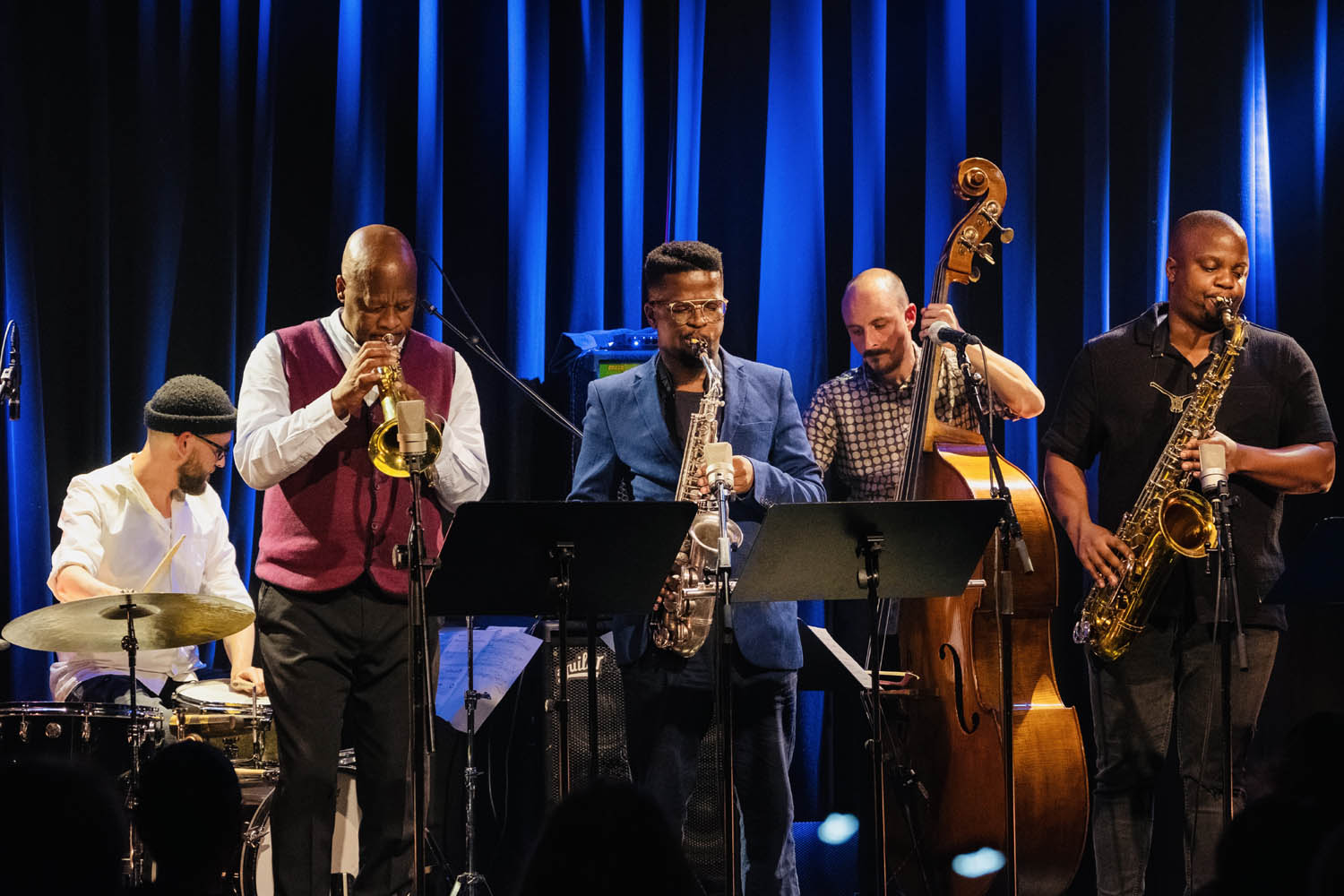
Plurism was founded in 2012 and started off as a Swiss trio. During a concert in Switzerland, Egli met Feya, a trumpet player who had visited the country multiple times before. Feya impressed Egli during a rehearsal. “I heard him play with such passion, even though no one else was around. I was moved to tears.” Since then, Feya has become an essential member of the group, joined this year by two more horn players from South Africa.
Plurism’s music is distinctly jazz, although it draws influence from African music. These influences might not be immediately apparent to listeners. When asked about cultural appropriation, Egli expressed his awareness of the issue. He clarified that he didn’t want to borrow from African music styles without understanding the context. “I believed that if I drew inspiration from it, I had to transform it into something truly different.” The drummer and his fellow musicians have undoubtedly succeeded in creating a unique sound. With ample room for improvisation in their compositions, every Plurism performance is distinct and special, Egli assures.
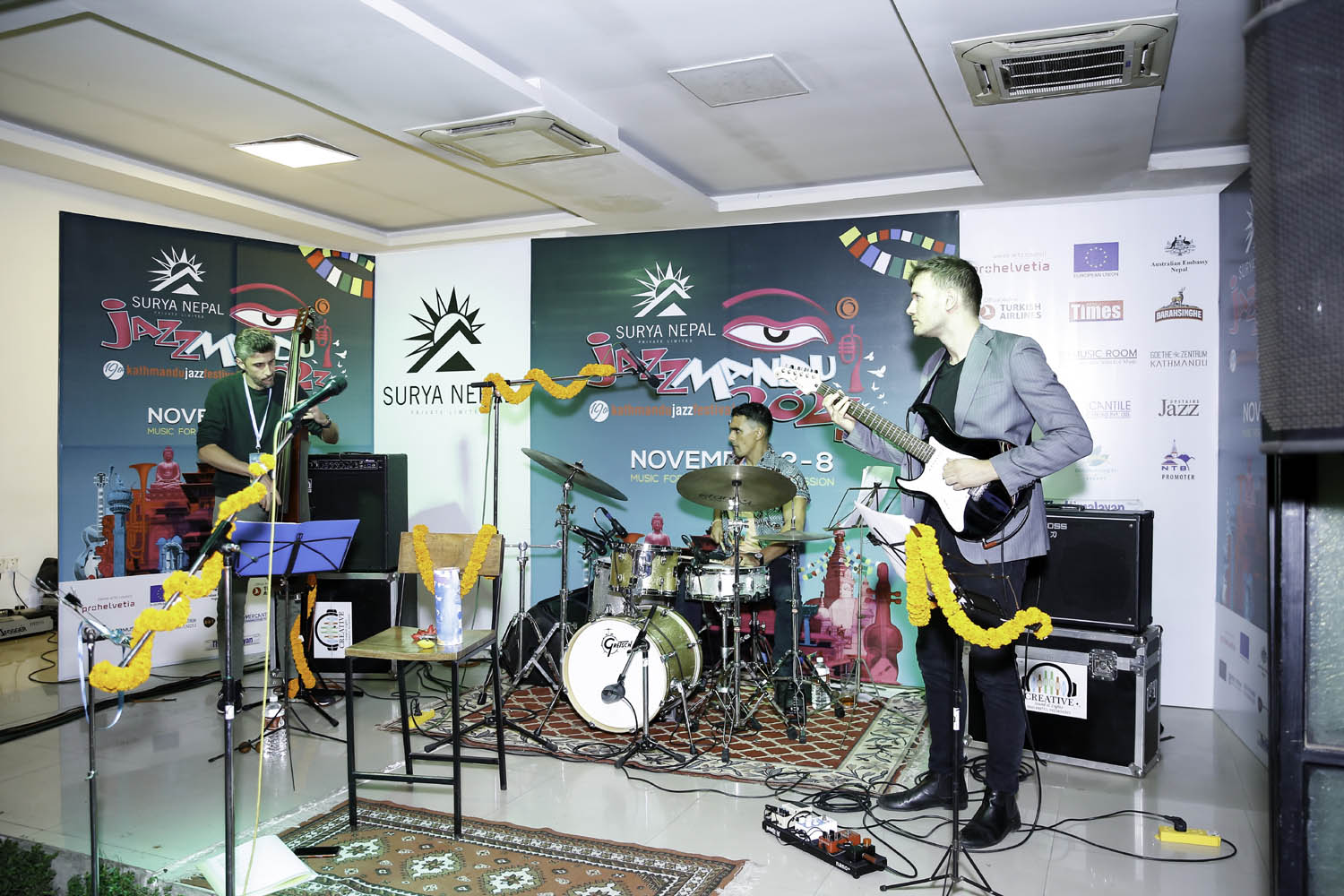
The band’s diverse musical influences are reflected in their name, Plurism, derived from the term ‘pluralism’, signifying variety in a broad sense. Egli associated the word with the belief in many gods and found it fitting. So, Nepal seems to be an interesting place for the band to play. One of the festival’s goals is to foster cultural interaction, which, although it might sound cliché, is the driving force behind the event, as noted by Chettri.
Cultural interaction isn’t just a buzzword for bands like Plurism; it’s a reality reflected not only in their music but also in the diverse composition of the band, spanning continents. This cross-cultural engagement is further enhanced through participation in Jazzmandu, where invited artists from different backgrounds mingle and collaborate.
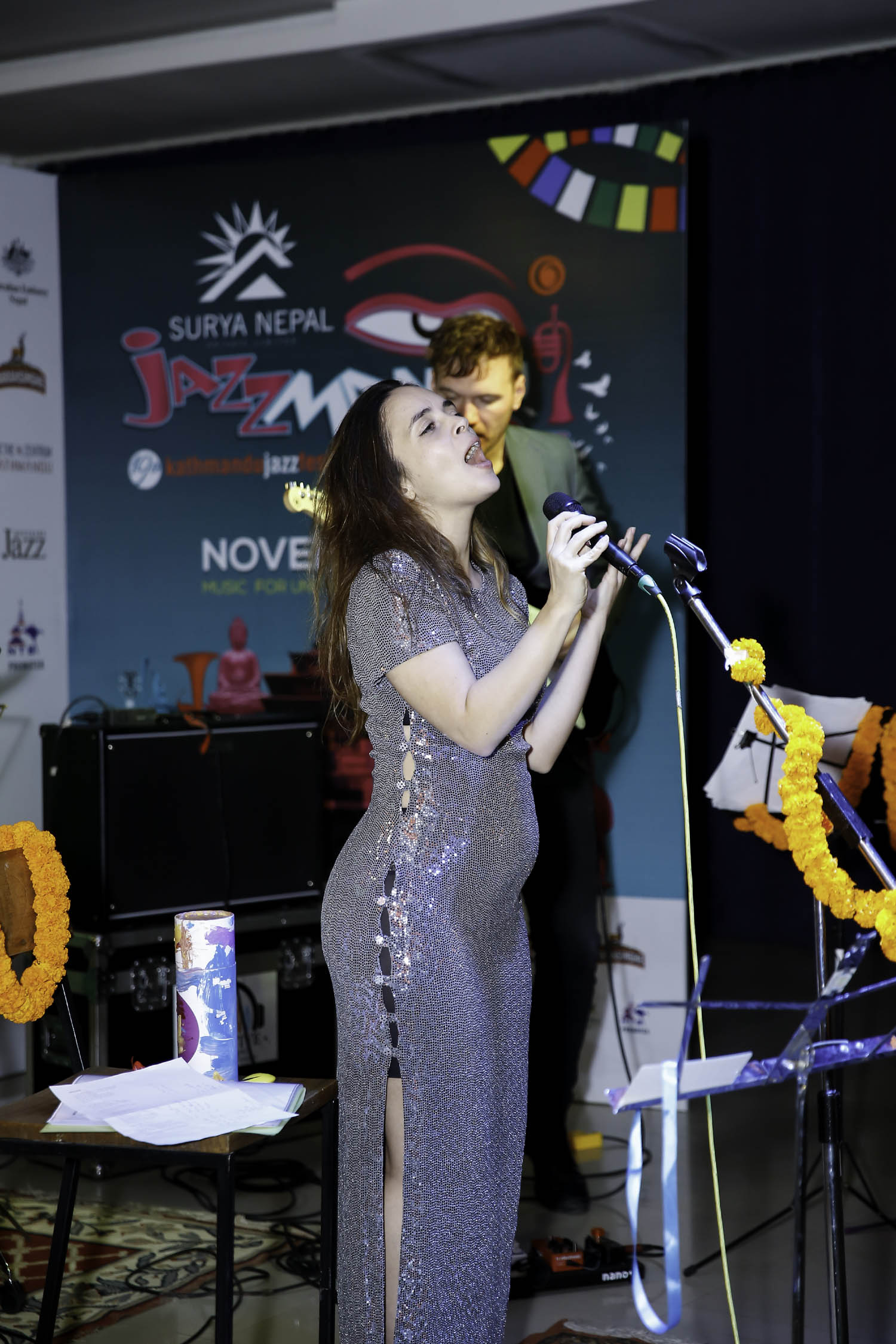
The festival offers various formats, encouraging musicians from different bands to perform together. One such event is the opening night jam session at Jazz Upstairs. Another notable event is the finale at the Hotel Yak & Yeti on November 8, when the entire festival lineup joins forces with Nepali classical musicians for a collaborative concert. Egli is enthusiastic about this opportunity to delve deeper into local musical traditions. “You can listen to as many CDs as you want or transcribe music, but playing it with someone—that takes it to the next level!” he remarks.
The festival features other talented acts from around the world. Attendees can enjoy performances by Under the Surface from the Netherlands, Lucile Chriqui and her band from France, US-Nepali combo Palouse Forro, jazz-fusion band Himalayan Highway as well as Nepali sitar player Dhruvesh with friends of Sukarma, the Nepali folk band Samundra Band and the eastern classical musicians Jonisha Poudel, Santosh Bhakta, Dhan Bahadur Gurung and Nimesh Kapali.
While the Jazz Bazaar at Gokarna Forest Resort, a highlight featuring multiple concerts, has already taken place, jazz enthusiasts and music lovers can still attend the ‘Sounds of Afro and Brazilian Jazz’ night at the restaurant Mulchowk. Additionally, on Tuesday, The Music Room and Yalamaya Kendra are hosting some masterclasses, where visiting musicians will share their experiences and stories. These sessions are not limited to musicians and jazz students; they are open to the public. Tuesday evening will also feature the concert night ‘Jazz at Patan’ at Yalamaya, where Nepali classical music fuses with jazz.
Meanwhile, at Jazz Upstairs, Chettri switches to the bongos, adding a vibrant Latin touch to the music. Over the next two hours, artists from different groups and countries take the stage, each picking up an instrument to play a song or two. The music shifts directions frequently, blending well-known jazz standards with spontaneous improvisations. The atmosphere in the club heats up, with enthusiastic applause from the audience. A Brazilian accordion player briefly transports the listeners to South America before Chettri takes the microphone, launching into a classic Blues Brothers tune. As the jam session concludes, there’s no doubt in the audience’s mind: they’ve experienced the unique atmosphere of Jazzmandu on this musical journey.




 14.12°C Kathmandu
14.12°C Kathmandu
